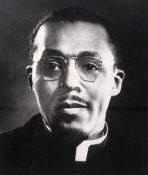Jordan Scholarship Fund History
"If you have yet to discover what really challenges your inner being and sets your whole soul a-tingling; find a quiet place and there unburden yourself before the presence of God and wait.—Wait until the insistent demands of the flesh are stilled; Wait until the chilling fears of our competitive material-minded society are quieted; Wait until the ambitions of parents and friends have passed under the scrutiny of a Sovereign God; Wait until the shadows of doubt and uncertainty yield to the clear light of divine purpose—Wait for that one clear call—God's call for your life." –Bishop Frederick Douglass Jordan, AME Review, 1987
Bishop Frederick Douglass Jordan
August 8, 1901- December 16, 1979
Parents of Bishop Jordan
1866- 1943
1870-1968
In June of 1976 during the Fortieth Quadrennial Session of the General Conference of the African Methodist Episcopal Church, Bishop Frederick Douglass Jordan, the 72nd Bishop of the Church, presented Morris Brown College a generous gift of $250, 000. The money became the basis of a fund dedicated to the memory of Bishop Jordan's deceased wife, Artishia Wilkerson Jordan, who died in 1974. In 1978 the Artishia Jordan Scholarship Fund was incorporated, and its title was changed to include the Bishop's name after his death on December 16, 1979. Between 1976 and 2009, approximately 1,000 scholarships were awarded to Morris Brown students who demonstrated financial need and exhibited academic potential, good character and an interest in community service.
Bishop Jordan attended Howard University as an undergraduate. As a sophomore during the 1919-1920 school year, he was a member of the Freshman-Sophomore Intercollegiate Debate Team. During his junior year (1920-1921), he was part of the executive committee which formed Howard’s first college branch of the NAACP. The group was formally recognized on February 25, 1921. It established an agenda which championed equal educational opportunity for black students, black voting rights, desegregation, and state and federal laws against lynching. The group sponsored lectures on campus by both James Weldon Johnson, Secretary of the NAACP, and W.E.B.Dubois, then the NAACP’s Director of Publishing and Research. Bishop Jordan was also the Treasurer of Howard’s first Student Council and a member of Alpha Phi Alpha Fraternity. Artishia, his wife, graduated in 1922 from Howard where she was active in the Kentucky Club, Alpha Kappa Alpha, the French Club, and the Howard chapter of the YWCA. She continued graduate work at Northwestern and University of Chicago. Bishop’s sister, Alice Jordan, also graduated from Howard and was active in the Student Government Association and Alpha Kappa Alpha Sorority.
In the fall of 1921 Bishop Jordan left Howard to complete his B.A at Northwestern University and to pursue concurrently a theological degree at Garrett Biblical Institute. While furthering his education, he began in 1923 his church career as pastor of St. Paul A.M.E. Church in Chicago. With a major in English and minors in economics and Greek, he received his B.A. from Northwestern in 1924 and a theology degree from Garrett on March 19, 1925.
Frederick Jordan was elected a bishop of the A.M.E. church in 1952. He was briefly president of Western College and a trustee at both Wilberforce and Western. In the early 1960s he served as president of Campbell College, an AME institution in Mississippi, but was harassed by local white authorities because of his fervent support of the civil rights movement in Mississippi. Campbell College was later merged with Jackson State.
Bishop Jordan was appointed in 1968 the head of the African Methodist Episcopal Office of Urban Ministries and Ecumenical Relations. He used this office to encourage church involvement in urban communities and to seek actively an alliance on a national level with other denominations, both black and white. He was a member of the General Board of the National Council of the World Methodist Council since the 1950s, was elected the first vice president of the National Council of Churches in 1969, and in 1973 became the first black chairman of the Consultation on Church Union (COCU), an organization founded in the early 1960s to forge a formal union of nine denominations. A true Renaissance man Bishop Frederick Douglass Jordan made substantial contributions to both the AME church and to the civic life of his community and the nation. He was an active participant in the NAACP and served on the national board of CORE. Both as a pastor and as a bishop he was known as a fervent and militant advocate for civil rights and progressive social change.
The Jordan family tradition continues at Howard University. Bishop Jordan’s family members who graduated from Howard include the daughters of Bishop Jordan’s first cousin, Eddie Jordan. The sisters are Patricia Jordan Cleveland Van Dyke (BS 1965), Jennifer Jordan (BA 1967; MA 1970), Jacqueline Jordan Irvine, (BA 1968; MA 1970) and Angela Jordan Davis (BA 1978). Dr. Irvine, retired Candler Professor at Emory University and 2010 recipient of the Howard University’s Charter Day Alumni Award for Distinguished Postgraduate Achievement, is President and Manager of the Jordan foundation. Angela Jordan Davis, Professor of Law at American University, is vice president. Dr. Jennifer Jordan is a professor in Howard’s Department of English, and Patricia Jordan Cleveland Van Dyke is a retired information technology executive.
Other members of the Jordan Scholarship Fund include Attorney Kelli Irvine Neptune and The Honorable Rhonda Reid Winston of the District of Columbia Superior Court.
Written by Dr. Jennifer Jordan
How to Apply
Contact Rankin Chapel for the scholarship application.
Applications are due in early April every year.



